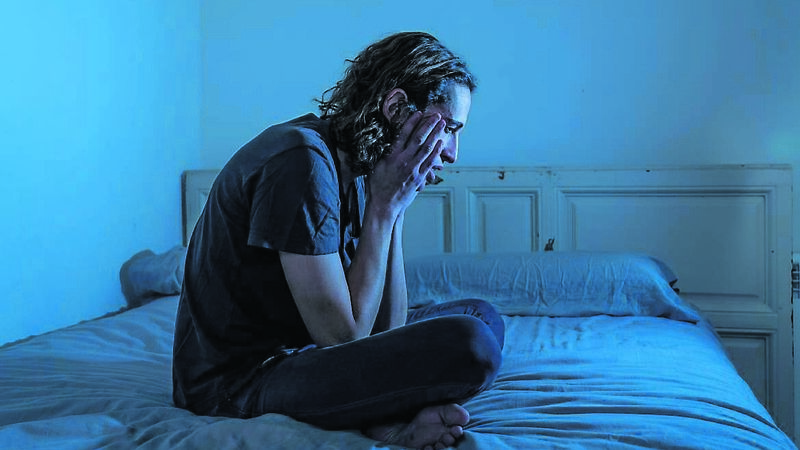The mask that can conceal depression

Depression affects approximately 3 in 5 people in Ireland. Picture: Stock posed by model
October is Mental Health Awareness Month, a time to acknowledge that mental health challenges are as significant and impactful as physical health problems.
It’s also an invitation to break the stigma surrounding these issues, encouraging us to talk openly about our struggles and seek the support we need and deserve.
Understanding Depression
Depression affects approximately 3 in 5 people in Ireland and is far more complex than simply feeling sad, low or down. Common symptoms include persistent sadness, loss of interest in activities, changes in appetite and sleep, and difficulty concentrating. However, these descriptions only scratch the surface.
Depression is an all-consuming condition that can permeate every aspect of a person’s life.
At its worst, it can lead to a profound sense of hopelessness and entrapment, sometimes resulting in thoughts of suicide as individuals see no way out.
However, while depression can affect every aspect of a person’s life, many hide it well and wear a mask. Appearing fine to the outside world while struggling immensely in private - leaving them to suffer in silence.
This silence perpetuates the stigma and shame of not being able to “cope like everybody else,” further isolating those affected. As shame thrives in isolation, the problem grows, feeding on itself. Therefore, talking openly about one’s struggles with friends, family, or health professional is the remedy.
Misconceptions and Stigma
For those who have never experienced it, depression can be difficult to comprehend. There is often a misguided belief that those struggling with depression could simply “snap out of it” or choose to get better. Comments like “stop moping around,” “just think positively,” or “everyone has bad days, get over it” only deepen the isolation and misunderstanding surrounding this condition, and stop people from seeking the support they need. If it were that easy to “snap out of it”, everyone would.
Meanwhile, some argue that depression is a choice, but if so, it is not a conscious one. Sometimes, it’s a survival mechanism, a way for the mind and body to shut down and protect themselves from overwhelming stress, trauma, or emotions they cannot cope with. It is not a deliberate decision but rather the brain’s way of managing something unmanageable.
What Causes Depression?
Many factors influence one’s likelihood of developing depression, including genetics, biology, grief, neurodivergence, and particularly traumatic experiences—past or present.
One’s upbringing also plays a role, as the ability to cope with adversity is often shaped by whether one was taught effective coping strategies and emotional intelligence.
Furthermore, substance abuse, often used as an attempt to self-medicate, can also worsen depression over time. Even difficult basic life circumstances such as financial strain, housing instability, and traumatic global events can also profoundly impact mental well-being.
Vulnerable Groups
While statistically, women are more likely to be diagnosed with depression, men are less likely to seek help and are at an increased risk of severe outcomes such as suicide. Societal pressures on men to appear strong and self-reliant often leave them without the social support they need and reduce the likelihood of them reaching out for help. This is why initiatives such as Movember and the Men’s Sheds Association, which aim to normalise conversations about men’s mental health, are so vital.
People living in rural areas also face additional challenges, such as social isolation, fewer social activities (other than the pub), and limited access to mental health services—all of which contribute to higher levels of depression.
Meanwhile, young people also report higher rates of depression partially due to stressors such as social pressure, academic demands, and unemployment.
All of this illustrates that depression is often a natural reaction to challenging circumstances where there is inadequate support or a lack of coping tools. Therefore, just as one would seek treatment for physical ailments, it is entirely natural and necessary to seek support for mental health.
Hope
If you are battling depression, remember that it is a part of you, but it does not define you. It may shape your current life experience, but it does not dictate your identity or future.
There is hope and help available. Reach out to trusted friends or family members, talk about what’s going on, and seek professional support from your GP and mental health professionals.
While one often hears about the benefits of self-care techniques such as mindfulness, exercise, and maintaining a routine, it’s important to recognise that during a depressive episode, even small victories such as getting out of bed or taking a shower are significant. Small steps accumulate and lead to meaningful change over time.
Supporting a Loved One
For those supporting a loved one through depression, your presence can be a lifeline. Small acts such as listening without judgment, offering practical help, and simply being there - make a huge difference.
Understand that supporting someone with depression can also be overwhelming and emotionally draining, so make sure you have your own self-care and support systems in place, too.
About the author
Mirin Mooney is a neurodivergent mental health coach, for more info, visit www.wildheart-wellness.com
Support information
If you or someone you love is struggling with depression, please reach out for the support you/they need:
Aware: www.aware.ie | Helpline: 1800 80 48 48
Samaritans: www.samaritans.org | Helpline: 116 123
Pieta: www.pieta.ie | Helpline: 1800 247 247
Jigsaw: www.jigsaw.ie
Cork Simon Community: www.corksimon.ie







 App?
App?




